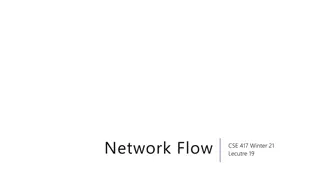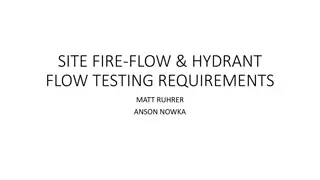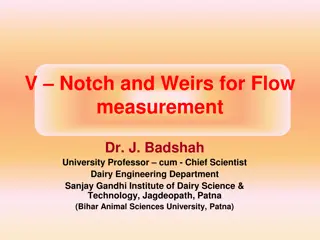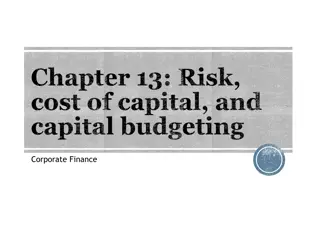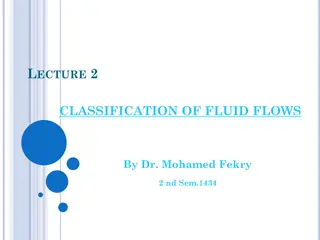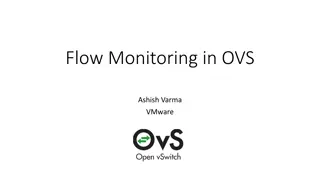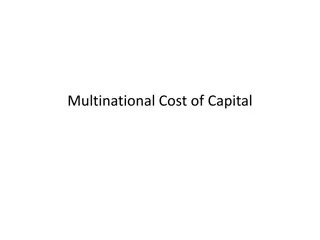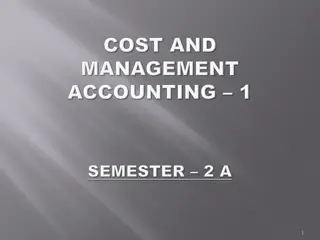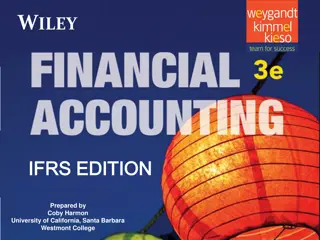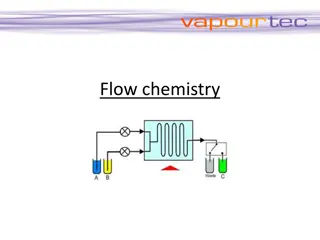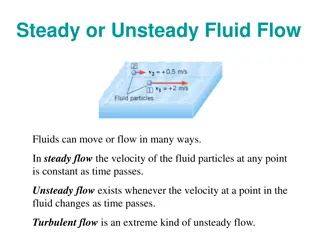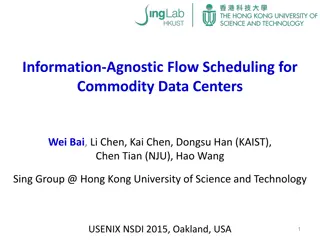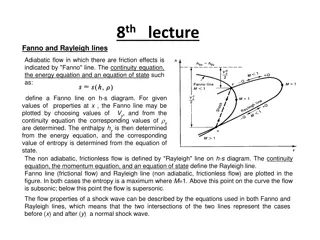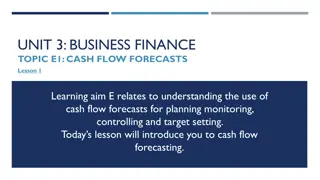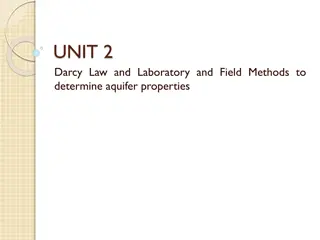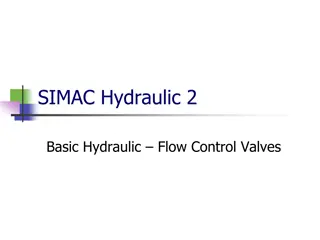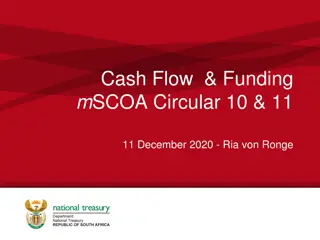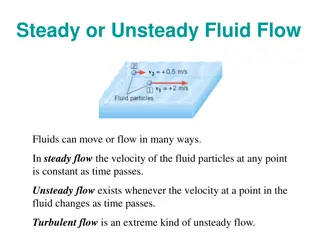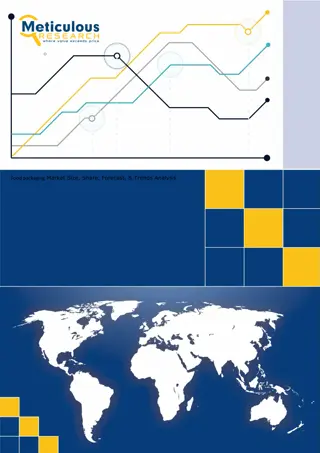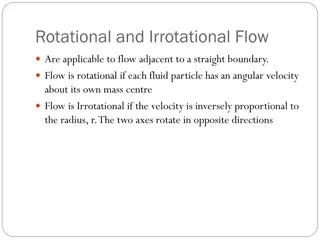The Psychology of Flow: Achieving Total Focus and Optimal Performance
Engage in activities for their intrinsic value, where the ego diminishes, and time seems to vanish - that's when flow occurs. This optimal psychological state involves deep concentration, clear goals, and a sense of control. By embracing challenges and staying in the present moment, one can cultivat
0 views • 13 slides
Understanding Runoff in Hydrology
Runoff in hydrology refers to surface water flow from precipitation and other sources in drainage basins. It plays a crucial role in stream flow and peak flood formation, influenced by factors like overland flow, interflow, and groundwater flow. This article explores the sources of runoff, including
3 views • 27 slides
Comprehensive Cost Management Training Objectives
This detailed training agenda outlines a comprehensive program focusing on cost management, including an overview of cost management importance, cost object definition, cost assignment, analysis, and reporting. It covers topics such as understanding cost models, cost allocations, various types of an
2 views • 41 slides
Understanding Max Flow in Network Theory
In network theory, understanding the concept of maximum flow is crucial. From finding paths to pushing flow along edges, every step contributes to maximizing the flow from a source to a target in the graph. The process involves determining capacities, creating flows, and calculating the net flow ent
2 views • 41 slides
Fire Flow Requirements and Calculation Methods
Detailed information on site fire flow and hydrant flow testing requirements, how to calculate required fire flow, applicable codes and standards including NFPA and IBC, duration of fire flow, methodologies for fire flow calculation, and ISO methods and formulas.
4 views • 30 slides
Academic Senate Resolutions and Low-Cost Thresholds in Higher Education
The Academic Senate addresses the adoption of open educational resources (OER) and low-cost materials to support academic freedom and compliance with legislative requirements. The resolution discusses the definition of low-cost resources and the variability among California Community Colleges in set
2 views • 9 slides
Flow Measurement Using V-Notch and Weirs in Engineering
Flow measurement in engineering involves the use of V-notch and weirs, such as rectangular weirs and triangular weirs, to calculate discharge rates and velocity of liquids. A V-notch is a triangular obstruction used for flow measurement, while weirs are larger scale structures for measuring river or
1 views • 7 slides
Understanding Cost Accounting Essentials
This overview delves into topics such as financial accounting, classification of accounts, cost ascertainment, and management accounting. It covers the meaning of cost, methods and techniques of costing, advantages and limitations of cost accounting systems, and essentials for a robust cost accounti
4 views • 27 slides
Project Cost Estimation: Methods and Factors
Project cost estimation involves valuing all monetary aspects necessary for planning, implementing, and monitoring a project. This includes various entrants such as preliminary investigation costs, design fees, construction expenses, and more. The purpose of cost estimation is to determine work volu
1 views • 44 slides
Importance of Cash Flow Analysis in Financial Management
Cash flow analysis is a crucial financial tool for effective cash management, aiding in evaluating financial policies and positions. It helps in planning, coordinating financial operations, assessing cash needs, and meeting obligations. However, it has limitations as it does not substitute the incom
1 views • 7 slides
Understanding Risk, Cost of Capital, and Capital Budgeting in Corporate Finance
Explore the concepts of risk, cost of capital, and capital budgeting in corporate finance, including the Capital Asset Pricing Model (CAPM), cost of equity, beta estimation, and cost of capital. Learn how to reduce the cost of capital and understand the impact of reducing the Weighted Average Cost o
0 views • 20 slides
Understanding the Kinetics of Fast Reactions in Chemistry
Kinetic methods involve measuring analytical signals under dynamic conditions to study fast reactions in chemistry. This study explores the various methods used, such as Flow Method and Stopped Flow Method, to determine reaction rates accurately. Advantages of the Stopped Flow Method over Continuous
0 views • 18 slides
Understanding the Importance of Flow Charts in System Processes
Flow charts are valuable tools that visually represent the flow of data and process steps within a system. They help define problems, sequence steps to solve them, and show alternatives if issues arise. By using standard symbols, flow charts facilitate communication between engineers and clients, ai
1 views • 35 slides
Understanding Fluid Flows in Fluid Mechanics
Fluid Mechanics is the study of fluids in motion or at rest, and their interactions with solids or other fluids. Fluid flows are classified based on various characteristics such as viscous versus inviscid regions, internal versus external flow, compressible versus incompressible flow, laminar versus
1 views • 16 slides
Understanding Flow Monitoring in OVS for Efficient Network Management
Learn how Flow Monitoring in Open vSwitch (OVS) allows controllers to track and manage changes to flow tables, enabling efficient network management. Explore topics such as Flow Mod programming, Flow Monitor messages, OVS support, monitoring vs. snoop, and practical examples of flow monitoring in ac
0 views • 9 slides
Cost Control and Cost Reduction Strategies in Business: Understanding Implementation Challenges
Understanding the concepts of cost control and cost reduction is crucial for businesses, but implementing them can be challenging. This chapter explores the influencing factors for success in cost control and reduction, emphasizing the importance of cultural aspects, leadership, and management appro
1 views • 15 slides
Understanding Activity-Based Costing (ABC) in Cost Management
Activity-Based Costing (ABC) is a strategic costing method that allocates overhead costs to products based on activities. It offers benefits such as accurate cost allocation and identifying cost drivers but also has challenges due to increased complexity and customization. ABC differs from tradition
1 views • 15 slides
Understanding the Cost of Capital in Finance
The cost of capital is crucial for businesses to determine the average cost of their finance. The Weighted Average Cost of Capital (WACC) is used as a discount rate in financial calculations. It involves estimating the cost of each source of finance and calculating a weighted average. Additionally,
0 views • 14 slides
Understanding Multinational Cost of Capital
Multinational corporations determine their cost of capital based on the cost of debt and equity. The cost of debt includes the interest rate and credit risk premium, while the cost of equity reflects the risk premium investors demand. Estimating an MNC's cost of capital involves assessing these comp
0 views • 24 slides
Understanding Cost Accounting: Techniques and Processes
Cost accounting is a specialized branch of accounting that involves the accumulation, assignment, and control of costs. It encompasses techniques like ascertainment of costs, estimation of costs, and cost control to aid in decision-making. Cost accounting plays a crucial role in budgeting, standard
2 views • 11 slides
Understanding Inventory Management in Financial Accounting
Explore the intricacies of inventory management in financial accounting through discussions on classifying inventory, determining inventory quantities, and the impact of inventory errors. Learn about inventory cost flow methods, the lower-of-cost-or-net realizable value basis, and the financial effe
3 views • 14 slides
Understanding Flow Chemistry for Efficient Chemical Reactions
Flow chemistry, also known as continuous flow or plug flow chemistry, revolutionizes chemical reactions by running them in a continuous flow stream. This dynamic process offers efficient manufacturing of chemical products with precise control over critical parameters like stoichiometry, mixing, temp
2 views • 7 slides
Fundamentals of Fluid Flow: Steady, Unsteady, Compressible, Incompressible, Viscous, Nonviscous
Fluid flow characteristics such as steady vs. unsteady, compressible vs. incompressible, and viscous vs. nonviscous play crucial roles in understanding how fluids behave in various scenarios. Steady flow entails constant velocities over time, while unsteady flow involves changing velocities. Liquids
0 views • 11 slides
Introduction to Industrial Costing: Understanding Cost Types and Accounting Systems
Explore the fundamentals of industrial costing, including different cost types and accounting systems such as actual cost accounting, normal cost accounting, and standard cost accounting. Learn about cost data control, tasks of cost accounting, and the integration of cost type accounting in cost and
1 views • 24 slides
Understanding Open Channel Flow and Mannings Equation
This review covers hydraulic devices such as orifices, weirs, sluice gates, siphons, and outlets for detention structures. It focuses on open channel flow, including uniform flow and varied flow, and explains how to use Mannings equation for calculations related to water depth, flow area, and veloci
1 views • 43 slides
Information-Agnostic Flow Scheduling: Minimizing FCT in Data Centers
This study explores information-agnostic flow scheduling for commodity data centers to minimize flow completion time (FCT) without prior knowledge of flow size. Existing solutions requiring prior flow size information are deemed infeasible for some applications and challenging to deploy in practice.
1 views • 46 slides
Understanding Internal Flow in Heat Transfer Processes
Exploring internal flow characteristics in heat transfer, we delve into topics like laminar flow, velocity profiles, Reynolds number, and entry lengths for different flow regimes. Images illustrate concepts such as fully developed velocity profiles and the impact of flow conditions on the mean veloc
0 views • 27 slides
Revolutionizing Sonographic Blood Flow Measurement with PixelFlux
Novelties in PixelFlux technology offer a groundbreaking approach to sonographic blood flow measurement, enabling precise and accurate flow volume calculations through innovative features such as three-dimensional Doppler angle correction, pixelwise flow analysis, and dynamic measurements throughout
0 views • 12 slides
Understanding Max-Flow and Min-Cut Problems in Graph Theory
This collection covers the concepts of max-flow and min-cut in directed graphs, focusing on moving water or data packets from a source to a target vertex within given capacities. It explains flow values, finding optimal solutions, and strategies for maximizing flow networks. The visuals aid in grasp
0 views • 58 slides
Understanding Fanno and Rayleigh Lines in Adiabatic Flow
Fanno and Rayleigh lines on the h-s diagram help in analyzing adiabatic flow with friction effects. The Fanno line represents frictional flow, while the Rayleigh line signifies non-adiabatic, frictionless flow. These lines aid in plotting flow properties and understanding phenomena like shock waves
0 views • 6 slides
Ford-Fulkerson Algorithm for Maximum Flow in Networks
The Ford-Fulkerson algorithm is used to find the maximum flow in a network by iteratively pushing flow along paths and updating residual capacities until no more augmenting paths are found. This algorithm is crucial for solving flow network problems, such as finding min-cuts and max-flow. By modelin
0 views • 26 slides
Understanding Cash Flow Forecasts in Business Finance
This lesson introduces cash flow forecasting in business finance, outlining the importance of predicting, monitoring, controlling, and setting targets for cash flow. It covers key terms, purpose of cash flow forecasting, cash inflows and outflows, and the structure of cash flow forecasts. Students w
0 views • 10 slides
Managing Summer Cost Share for Faculty with 9-Month Appointments
Explore the process of setting up and monitoring summer cost share for faculty with 9-month appointments. Learn why cost share for summer may not display on the FEC, how GCA establishes cost share using the Cost Share Module, and how departments should adjust the FEC to reflect summer cost share acc
0 views • 15 slides
Challenges of Flow Rate Fairness in Network Resource Allocation
Addressing the concept of flow rate fairness in network resource allocation, this content explores its limitations and challenges. Despite being a goal in protocols like TCP, the practicality and enforceability of flow rate fairness are questioned. It highlights the inadequacy of flow rate as a meas
0 views • 15 slides
Understanding Darcy Law and Methods for Aquifer Property Evaluation
Darcy Law, introduced by Henry Darcy, defines the relationship between flow rate, head loss, cross-sectional area, and flow path length in porous media like aquifers. By conducting experiments and measuring hydraulic conductivity, Darcy Law allows estimation of groundwater velocity and flow characte
0 views • 49 slides
Basic Hydraulic Flow Control Valves Overview: Types and Functions
Basic Hydraulic Flow Control Valves play a crucial role in regulating fluid flow in hydraulic systems. This comprehensive guide covers various types of flow control valves such as throttle valves dependent on viscosity, meter-in/meter-out/bypass flow control valves, and more. Learn about their funct
0 views • 15 slides
Municipal Cash Flow Management Challenges and Solutions
The circular issued highlights challenges faced by municipalities in managing cash flow information correctly, including errors in using mSCOA segments and linking MBRR cash flow tables. The data strings used for budgeting, transacting, and reporting cash flow are discussed, covering cash receipts,
0 views • 23 slides
Understanding Fluid Flow: Steady vs. Unsteady, Compressible vs. Incompressible, Viscous vs. Nonviscous
Fluid flow can be categorized into different types such as steady or unsteady, compressible or incompressible, and viscous or nonviscous. Steady flow maintains constant velocity over time, while unsteady flow involves changing velocities. Liquids are typically incompressible, whereas gases can be co
0 views • 12 slides
mass flow controllers (1)
The global mass flow controllers market is segmented by product type (thermal mass flow controllers, Coriolis mass flow controllers, differential pressure mass flow controllers), flow rate (low (0-50 slpm), medium (0-300 slpm), high (0-1500 slpm)), e
0 views • 5 slides
Understanding Fluid Flow and Measurement Devices
The concept of rotational and irrotational flow adjacent to a straight boundary, along with the dynamics of fluid flows and laws governing fluid flow like the continuity equation and energy equation, are discussed. Insights into devices for flow measurement such as venturimeter, pitot tube, orifices
0 views • 4 slides



